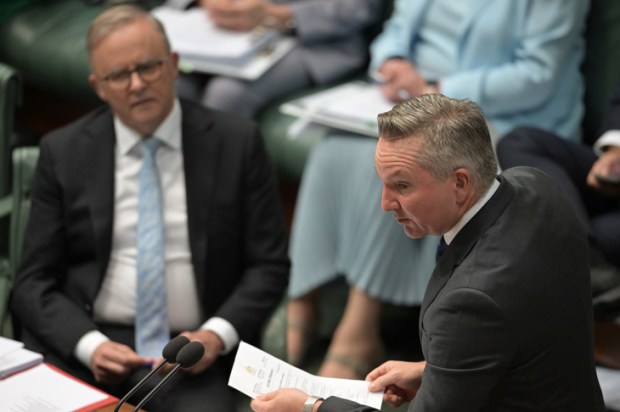Who is writing Paul Keating’s talking points these days? Those familiar with his tirades might have detected in his latest jeremiad the peculiar use of the word ‘earnest’. Issued on Sunday, it ranted about the perfidy of the opposition leader in advocating nuclear power saying that, ‘Only the most wicked and cynical of individuals would foist such a blight on an earnest community like Australia.’ It wasn’t just a typo because in the next paragraph the author fulminated that Mr Dutton, ‘in his low-rent opportunism, mocks the decency and earnestness which recognises that carbon must be abated and with all urgency.’
Would Mr Keating genuinely describe Australia as an ‘earnest’ community? It hardly fits with the politician who was infamous for descending into the gutter to call his opponents ‘scumbags’ who couldn’t manage ‘a tart shop’, described his parliamentary opposite number as ‘a little desiccated coconut’ who slithered out of the cabinet room like a ‘mangy maggot’, and referred to the governor-general as a ‘pumped up bunyip potentate’.
Nothing about the Sunday statement sounds like it comes from Mr Keating’s pen. The author describes renewables as ‘the remedy nature has given us to underwrite our life on earth’ and writes that ‘by his blatant opposition to renewables, Dutton calls into question and deprecates all the government has done to… lift the carbon menace off its back.’
Age has not mellowed Mr Keating who has made a seamless transition from an ‘angry young man’ to a ‘grumpy old man’ with nothing in between and Keating never had any respect for eloquence. He once castigated Labor Senator ‘Diamond’ Jim McClelland for having swallowed ‘a f–king dictionary when he was 15’ and said that it didn’t give McClelland the right to pour a bucket of excrement, or words to that effect, over the rest of us. So it’s hard to believe that Keating, who once proudly claimed that he tried to use the Australian idiom to its maximum advantage, has written these stilted phrases. But if not Keating then who?
For a number of years there has been an uncanny alignment between Keating’s outbursts and Chinese interests. Chinese editorial writers are also fond of antique expressions that sound as if they came out of a Sino-English phrase book written during the Cultural Revolution. Calling Prime Minister Albanese a ‘handsome boy’ is a good example.
And as it happens, earnestness seems to be in vogue this month at China’s Global Times. In an editorial on 20 June, ‘Xi called on relevant personnel at all levels, especially senior cadres, to introspect, engage in soul-searching reflections, and make earnest rectifications.’
A day earlier the paper editorialised that ‘Speaking of the changes of Xiaogucheng village over the past 20 years, local residents are all grateful for the earnest care and guidance provided by Xi Jinping, general secretary of the CPC Central Committee, over village life.’
On 18 June an article was headlined, ‘Earnest efforts empower revitalisation – Exploring China’s rural transformation along Xi’s footsteps.’
On the same day, China’s State Taxation Administration intoned that, ‘Only companies’ sound development can create more taxes … stressing that it’s always committed to the earnest implementation of favourable policies while strictly preventing illegal behaviours, to support the healthy and regulated development of businesses’.
What about ‘deprecate’? It turns out that this is another word favoured by the Global Times. For example, in an editorial earlier this year the paper wrote that, ‘Hong Kong continues to be a hub attracting international talent, and it is highly irresponsible to deprecate the city’s freedom and human rights conditions, Wang Wenbin, the Foreign Ministry spokesperson, said in Beijing on Monday.’
It goes without saying that China fervently wants Australia, and indeed all Western countries, to embrace a 100 per cent renewables strategy. Not only is it eye-wateringly expensive and unreliable but it would make Australia reliant on Chinese exports for an essential economy-wide input.
But what China wants for the West is not what it wants for itself. Not only is it building more than twice as much coal-fired generation capacity as all other countries combined, it is building 27 nuclear reactors, more than any other country on earth, to add to its fleet of 56 reactors.
If Mr Keating really believes that nuclear power is ‘the most dangerous and expensive energy source on the face of the earth’ will he voice his opposition to China’s burgeoning nuclear industry which, according to a report released this week by the Information Technology & Innovation Foundation, is planning to build six to eight new nuclear power plants each year and 150 nuclear power reactors between 2020 and 2035.
Mr Keating sat on the board of the China Development Bank (CDB) from 2005 to 2018. Did he manage to voice his objections to nuclear power there? After all, as a CDB report from May 2016 notes, it is the main source of financial support for China’s nuclear power projects issuing billions of renminbi in low cost loans towards the installation and operation of 88GW of nuclear power.
While Mr Albanese claims that building nuclear power plants is too slow, in China plants are being built on average in five to seven years at a cost of between USD $2,500 to USD $3,000 per kilowatt or USD$2.5-3 billion per gigawatt, about a third of the cost of recent projects in the US and France.
What that suggests is that the cost of nuclear power is going to fall dramatically even before you consider that China is leading the development of small modular reactors which are expected to cut the cost of nuclear power even further because the elements that make up a nuclear power plant will be produced as modules in factories and will consequently benefit from cost reductions due to economies of scale.
Only a fortnight ago, Labor Trade Minister Senator Don Farrell signed on to the Indo-Pacific Economic Framework for Prosperity Agreement relating to a Clean Economy which recognises ‘the important role that nuclear energy and civil nuclear cooperation play in ensuring energy security as well as providing affordable low-carbon energy’ and includes a work program on small modular nuclear reactors.
South Australia Premier Peter Malinauskas, who in May travelled to the US for meetings with senior figures about the Aukus nuclear submarines program and is close to Senator Farrell – both come from South Australia and both are conservative Christians – has previously called for a science-based debate around nuclear energy.
Don’t expect anything resembling either science or a debate from Mr Albanese. His grasp of the subject seems to have congealed in the 1970s with the notion that nuclear power will result in one-eyed dogs, two-headed cows, three-eyed koalas, or four-eyed fish. Will Mr Albanese refrain from attending the Paris Olympics for fear of eating a contaminated croissant? As for Mr Keating, like an errant character in a play by Oscar Wilde he seems to have discovered, thanks to his Chinese friends, the vital Importance of Being Earnest.
Got something to add? Join the discussion and comment below.
You might disagree with half of it, but you’ll enjoy reading all of it. Try your first month for free, then just $2 a week for the remainder of your first year.













